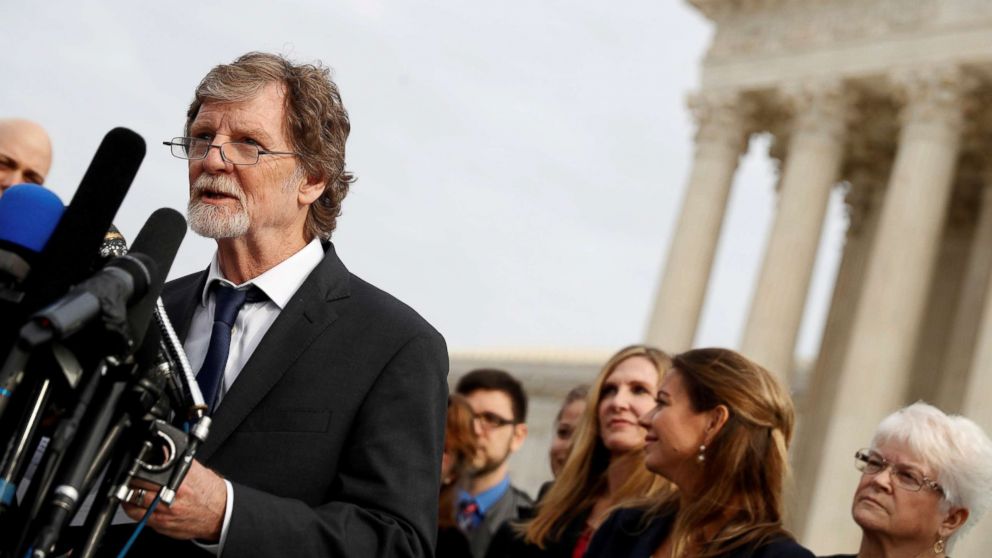
When Christian bakery owner Jack Phillips won a landmark U.S. Supreme Court case in June over his refusal to make a wedding cake a gay couple based on his religious convictions, he thought his legal battles with the state of Colorado were over, according to a lawsuit.
But now Phillips, owner of Masterpiece Cakeshop in Lakewood, Colorado, is facing a new court fight, this one involving a lawyer who asked him to bake a cake to celebrate the anniversary of her gender transition.
Phillips filed a federal lawsuit this week accusing the state of Colorado of “anti-religious hostility” against him and asked the U.S. District Court in Denver to overturn a Colorado Civil Rights Commission ruling that he discriminated against a transgender person.
“He’s extremely disappointed because the Supreme Court’s decision was very clear. It condemned Colorado’s hostility toward his religious beliefs,” Phillips lawyer, Kristen Waggoner, told ABC News on Thursday.
The lawsuit, filed Tuesday, names Colorado Gov. John Hickenlooper, state Attorney General Cynthia Coffman, and all seven members of the state Civil Rights Commission as defendants. It also names Aubrey Elenis, director of the Colorado Civil Rights Division as a defendant.
“Colorado [Civil Rights Commission] is intent on continuing its campaign to crush him and his business,” said Waggoner, of the conservative Christian nonprofit law firm Alliance Defending Freedom. “It’s sobering, it’s disappointing, it’s tiring and we should expect more and demand more from our government. It’s deeply disturbing that the state government would disregard the Supreme Court’s decision.”
The Colorado Civil Rights Commission, according to the lawsuit, ruled that Phillips violated the state’s non-discrimination law when he declined to bake the cake for Autumn Scardina, who says she was celebrating her birthday and the seventh anniversary of her gender transition, according to the lawsuit.
Scardina specifically requested a cake with a blue exterior and a pink interior that, according to the suit, reflected her transition from male to female.
“Phillips declined to create the cake with the blue and pink design because it would have celebrated messages contrary to his religious belief that sex–the status of being male or female–is given by God, is biologically determined, is not determined by perceptions or feelings and cannot be chosen or changed,” according to the lawsuit.
The lawsuit also claims Scardina called Phillips bakery back several times asking the staff to create cakes celebrating Satan, orders they say they also rejected.
“The person is a lawyer and an LGBT activist,” Waggoner said of Scardina. “While Jack has become accustomed to activists trying these kinds of actions, we’re focusing on what the government does because the government’s role is to protect all Americans and not just those with whom it agrees in terms of ideology.”
She said the state has also shown a “double standard” by zeroing in on Phillips, but not other bakers who have declined requests for cakes with messages they deemed objectionable.
Scardina did not return messages from ABC News seeking comment.
She placed the gender celebration cake order with Phillips the same day the U.S. Supreme Court announced it would hear Phillips’ first case against the state, according to the lawsuit.
In 2012, David Mullins and Charlie Craig filed a complaint with the Colorado Civil Rights Commission after Phillips told them he would not make their wedding cake because it was counter to his religious beliefs. The couple argued he had violated Colorado law, which prohibits discrimination on the basis of sexual orientation.
The nation’s highest court issued a 7-2 ruling on June 4 that affirmed Phillips’ right to refuse to bake the couple a cake on religious objections to same-sex marriage.
Waggoner said that 24 days after Phillips prevailed in the Supreme Court, he was informed he violated Colorado law by declining to create the cake Scardina requested.
Phillips says the first court battle cost him 40 percent of his business and prompted him to lay off six of his 10 employees. He says he also endured death threats and his shop was vandalized.
“The state’s continuing efforts to target Phillips do not just violate the Constitution; they cross the line into bad faith. This court should put a stop to Colorado’s unconstitutional bullying,” the lawsuit states.
Both State Attorney General Cynthia Coffman and the Civil Rights Commission declined to comment.
During a news conference on Wednesday, Hickenlooper said he expects Phillips’ new lawsuit to go to the U.S. Supreme Court.
“The first ruling from the Supreme Court did not address the basic issue” of religious freedom, Hickenlooper said. “That’s what I think the U.S. Supreme Court will have to address this time.
“When you’re talking about people’s religion, it doesn’t matter what religion, it’s one of the most tightly held American freedoms that we have,” the governor said. “It’s why millions of people fought and lost their lives.”





